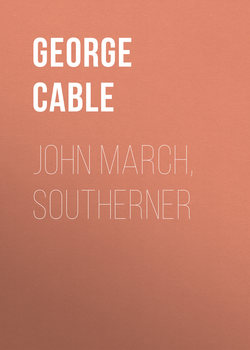Читать книгу John March, Southerner - Cable George Washington - Страница 4
IV.
THE JUDGE'S SON MAKES TWO LIFE-TIME ACQUAINTANCES, AND IS OFFERED A THIRD
ОглавлениеThey had been ascending a long slope and were just reaching its crest when the Major exclaimed, under his voice, "Well, I'll be hanged!"
Before them stood three rusty mules attached to a half load of corn in the shuck, surmounted by a coop of panting chickens. The wheels of the wagon were heavy with the dried mud of the Sandstone County road. The object of the Major's contempt was a smallish mulatto, who was mounting to the saddle of the off-wheel mule. He had been mending the rotten harness, and did not see the two soldiers until he lifted again his long rein of cotton plough-line. The word to go died on his lips.
"Why, Judge March!" Major Garnet pressed forward to where, at the team's left, the owner of these chattels sat on his ill-conditioned horse.
"President Garnet! I hope yo' well, sir? Aw at least," noticing the lame arm, "I hope yo' mendin'."
"Thank you, Brother March, I'm peart'nin, as they say." The Major smiled broadly until his eye fell again upon the mulatto. The Judge saw him stiffen.
"C'nelius only got back Sad'day," he said. The mulatto crouched in his saddle and grinned down upon his mule.
"He told me yo' wound compelled slow travel, sir; yes, sir. Perhaps I ought to apologize faw hirin' him, sir, but it was only pending yo' return, an' subjec' to yo' approval, sir."
"You have it, Brother March," said Major Garnet suavely, but he flashed a glance at the teamster that stopped his grin, though he only said, "Howdy, Cornelius."
"Brother March, let me make you acquainted with one of our boys. You remember Squire Ravenel, of Flatrock? This is the only son the war's left him. Adjutant, this is Judge March of Widewood, the famous Widewood tract. Jeff-Jack was my adjutant, Brother March, for a good while, though without the commission."
The Judge extended a beautiful brown hand; the ragged youth grasped it with courtly deference. The two horses had been arrogantly nosing each other's muzzles, and now the Judge's began to work his hinder end around as if for action. Whereupon:
"Why, look'e here, Brother March, what's this at the back of your saddle?"
The Judge smiled and laid one hand behind him. "That's my John – Asleep, son? – He generally is when he's back there, and he's seldom anywhere else. Drive on, C'nelius, I'll catch you."
As the wagon left them the child opened his wide eyes on Jeff-Jack, and Major Garnet said:
"He favors his mother, Brother March – though I haven't seen – I declare it's a shame the way we let our Southern baronial sort o' life make us such strangers – why, I haven't seen Sister March since our big union camp meeting at Chalybeate Springs in '58. Sonnie-boy, you ain't listening, are you?" The child still stared at Jeff-Jack. "Mighty handsome boy, Brother March – stuff for a good soldier – got a little sweetheart at my house for you, sonnie-boy! Rosemont College and Widewood lands wouldn't go bad together, Brother March, ha, ha, ha! Your son has his mother's favor, but with something of yours, too, sir."
Judge March stroked the tiny, bare foot. "I'm proud to hope he'll favo' his mother, sir, in talents. You've seen her last poem: 'Slaves to ow own slaves – Neveh!' signed as usual, Daphne Dalrymple? Dalrymple's one of her family names. She uses it to avoid publicity. The Pulaski City Clarion reprints her poems and calls her 'sweetest of Southland songsters.' Major Garnet, I wept when I read it! It's the finest thing she has ever written!"
"Ah! Brother March," the Major had seen the poem, but had not read it, "Sister March will never surpass those lines of her's on, let's see; they begin – Oh! dear me, I know them as well as I know my horse – How does that – "
"I know what you mean, seh. You mean the ballad of Jack Jones!
"'Ho! Southrons, hark how one brave lad
Three Yankee standards – '"
"Captured!" cried the Major. "That's it; why, my sakes! Hold on, Jeff-Jack, I'll be with you in just a minute. Why, I know it as – why, it rhymes with 'cohorts enraptured!' – I – why, of course! – Ah! Jeff-Jack it was hard on you that the despatches got your name so twisted. It's a plumb shame, as they say." The Major's laugh grew rustic as he glanced from Jeff-Jack, red with resentment, to Judge March, lifted half out of his seat with emotion, and thence to the child, still gazing on the young hero of many battles and one ballad.
"Well, that's all over; we can only hurry along home now, and – "
"Ah! President Garnet, is it all over, seh? Is it, Mr. Jones?"
"Can't say," replied Jeff-Jack, with his down-drawn smile, and the two pairs went their opposite ways.
As the Judge loped down the hot turnpike after his distant wagon, his son turned for one more gaze on the young hero, his hero henceforth, and felt the blood rush from every vein to his heart and back again as Mr. Ravenel at the last moment looked round and waved him farewell. Later he recalled Major Garnet's offer of his daughter, but:
"I shall never marry," said John to himself.
